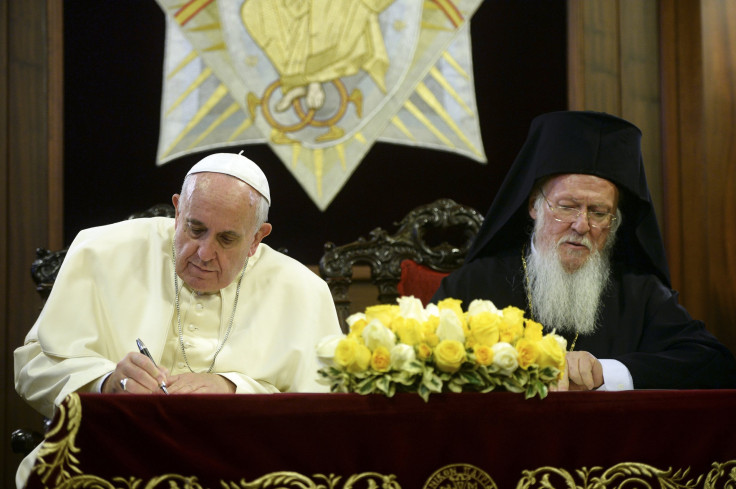End Modern Slavery By 2020? Pope Francis Leads Multifaith Effort Against Forced Labor, Prostitution

The Vatican has made it its mission to free the estimated 30 million people around the world who live as modern-day slaves, and religious leaders from several different faiths have joined Pope Francis in condemning the practice, according to the Associated Press. The Pope was joined Tuesday at a signing ceremony by Buddhist, Jewish, Muslim and Christian leaders in declaring an end to slavery by 2020.
Pope Francis has previously made curtailing modern slavery one of his top priorities. "Here he came into contact with the drug situation, the situation of the excluded -- and naturally the most dramatic form of exclusion is slavery, which is forced labor and prostitution," Bishop Marcelo Sánchez Sorondo told the AP of the pope's previous service in his native Argentina. Ending modern slavery will largely involve governments enacting and enforcing their own anti-slavery laws, however, public awareness will also play a key role, according to Kevin Bales, director of the nonprofit organization Free the Slaves.
Modern slavery includes people who are forced to do labor, trafficked into prostitution or sexual exploitation, or coerced into child marriages or other forms of servitude. Human rights groups estimate that there are between 30 million and 35 million modern-day slaves around the globe. “Trafficking in persons is a serious crime and a grave violation of human rights,” according to the United Nations Office of Drugs and Crime. “Every year, thousands of men, women and children fall into the hands of traffickers, in their own countries and abroad. Almost every country in the world is affected by trafficking, whether as a country of origin, transit or destination for victims.”
Mauritania has the highest percentage of people living as slaves. A report by Australia-based Walk Free Foundation found that 4 percent of the country’s population is enslaved, however, some estimates put the proportion of Mauritania’s enslaved population as high as 20 percent, according to the Washington Post. Other countries with high rates of slavery are Haiti, Pakistan, India, Nepal and Moldova.
Rich countries tend to have the lowest rates of modern slavery. A study by the British Home Office found that between 10,000 and 13,000 victims of slavery live in the U.K., many of them women who were forced into prostitution or domestic labor. U.K. Home Secretary Theresa May said in November that “the time has come for concerted, coordinated action.... We must step up the fight against modern slavery in this country and internationally to put an end to the misery suffered by innocent people around the world.”
© Copyright IBTimes 2025. All rights reserved.






















